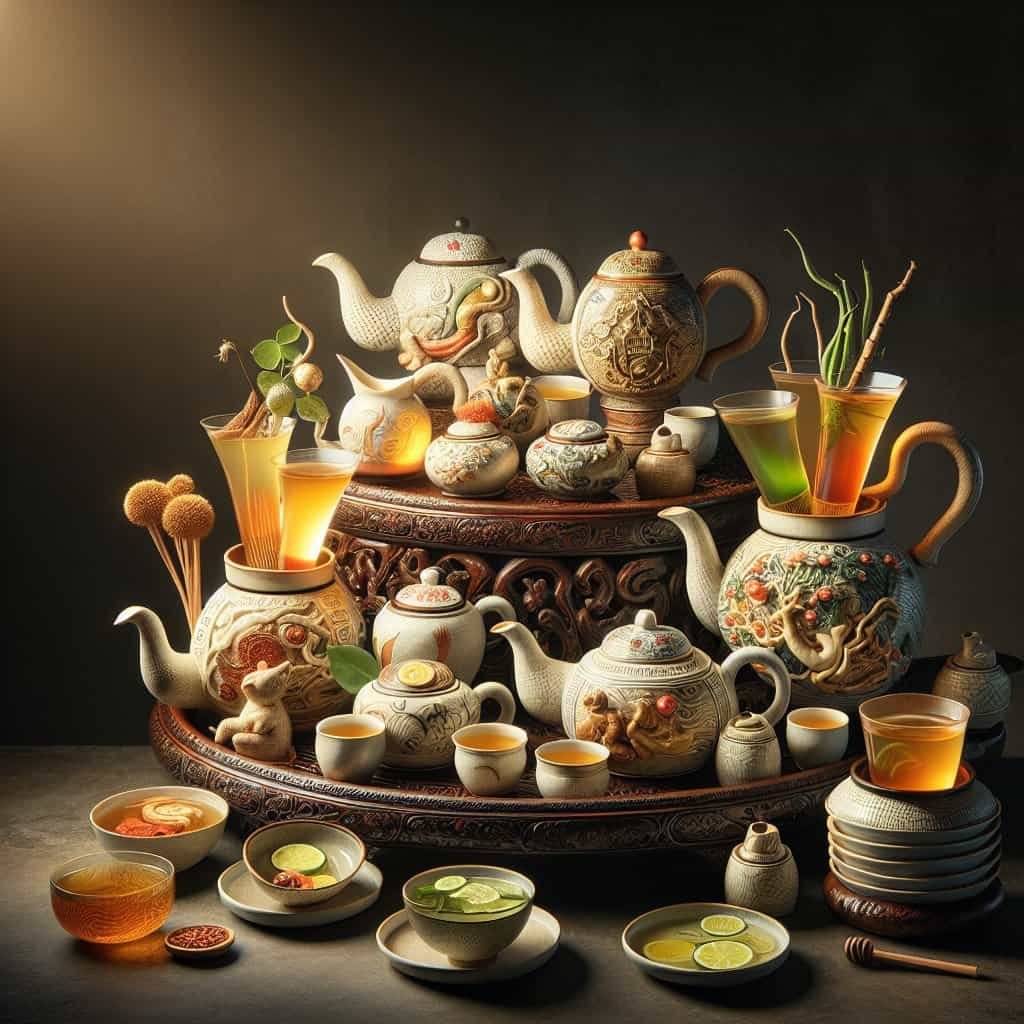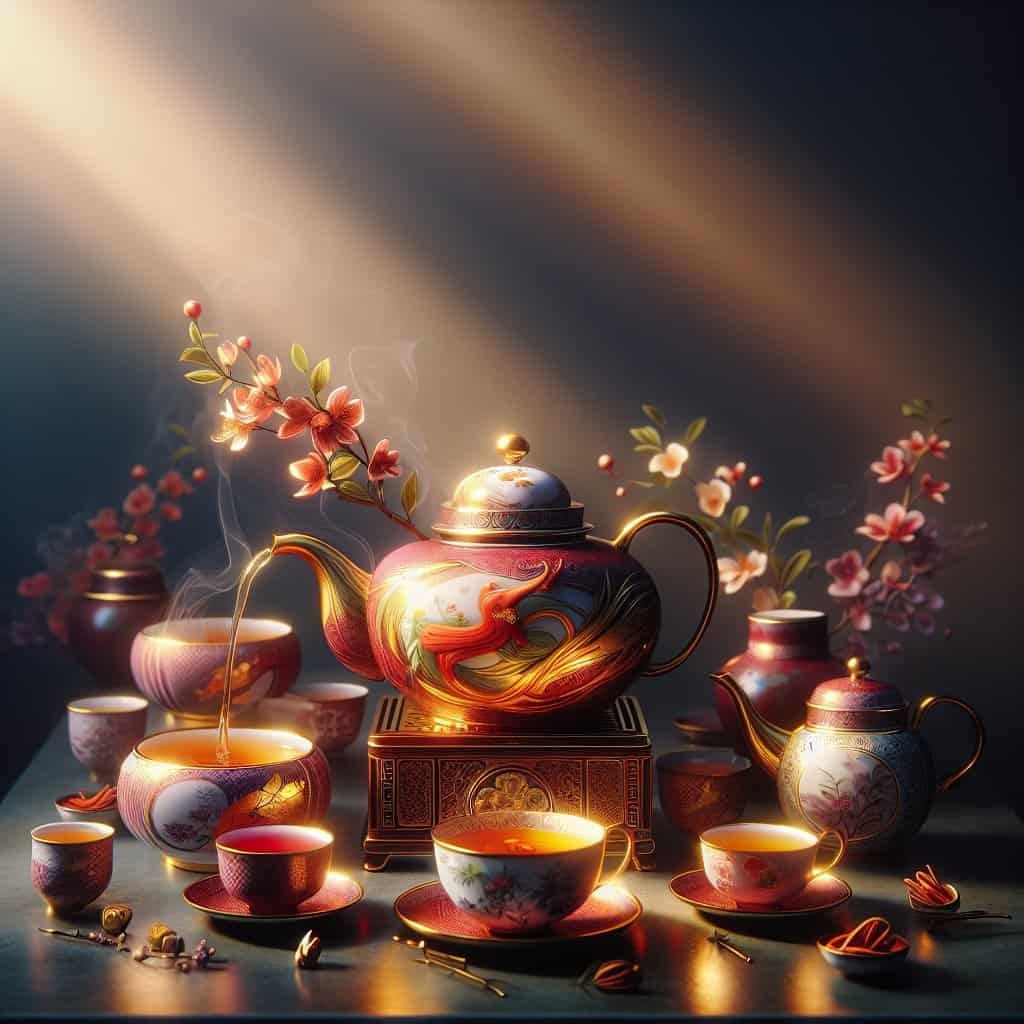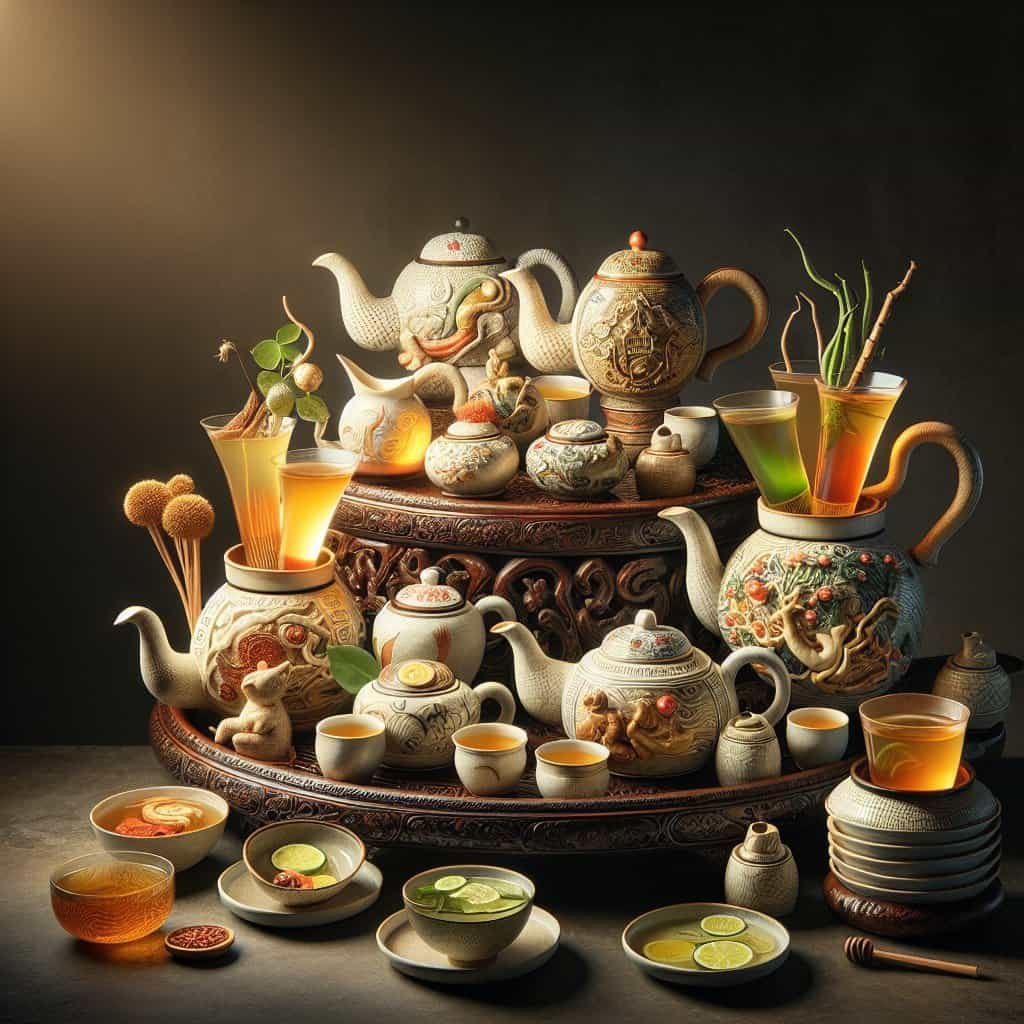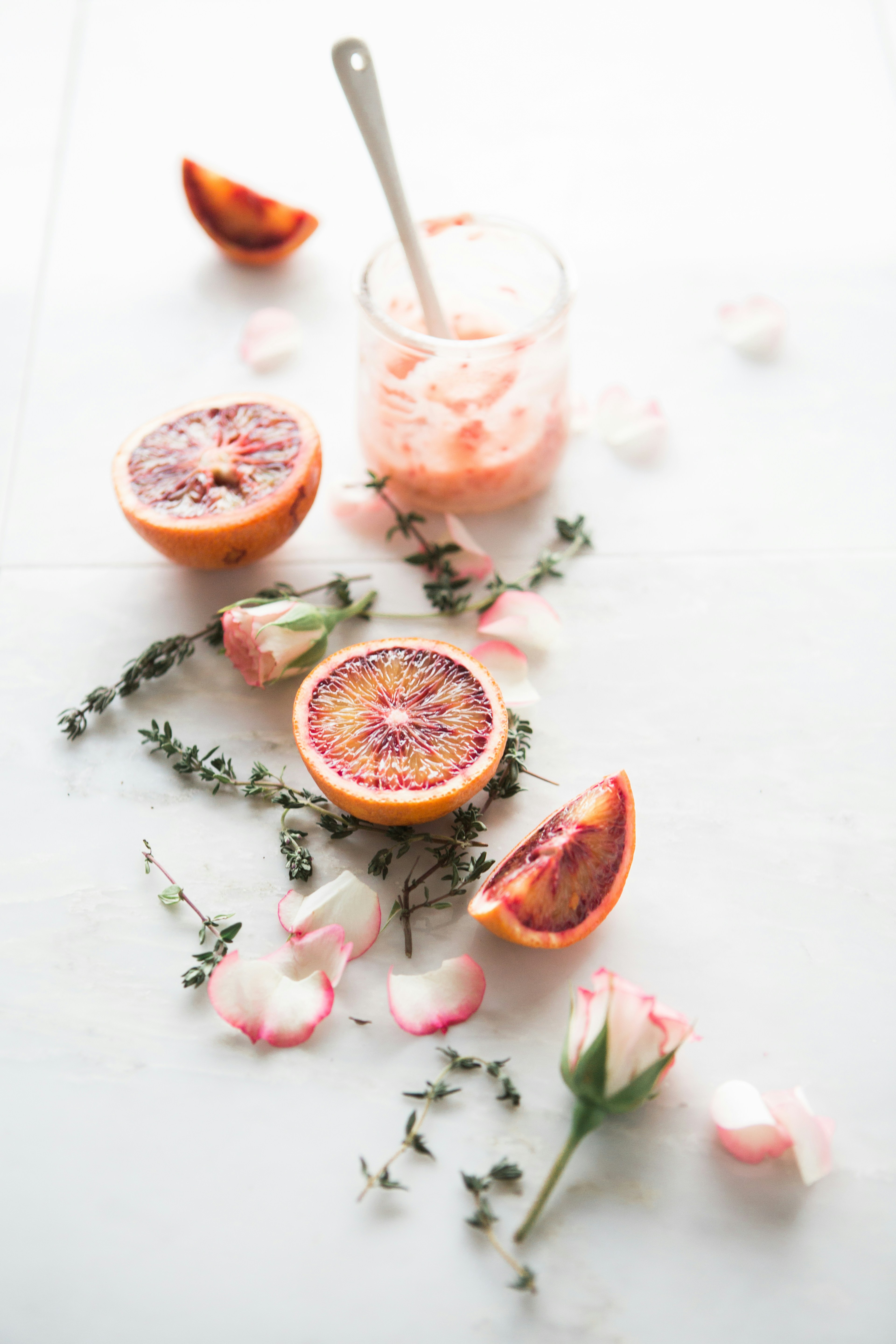If you’re looking to elevate your cocktail game with a touch of creativity and cultural fusion, look no further than the intriguing world of traditional Korean teas. Get ready to embark on a journey of flavors and discover some avant-garde techniques to incorporate these teas into your favorite libations. From the sweet and floral notes of yuja cha to the earthy and aromatic properties of daechu cha, there’s a whole universe of possibilities waiting to be explored. Let’s delve into the realm of traditional Korean teas and uncover the exciting ways they can be infused into cocktails, creating a harmonious blend of tradition and innovation.
1. Introduction to Traditional Korean Teas
Traditional Korean teas have a rich history and cultural significance that extends back centuries. In Korean culture, tea is more than just a beverage; it is considered a form of art and an essential part of social rituals and ceremonies. The tradition of tea drinking in Korea dates back to the 7th century, influenced by China and Buddhist monks who introduced various tea plants and brewing techniques. Today, Korean teas are known for their delicate flavors, unique aroma, and health benefits.
1.1 History and Culture
Korean tea culture can be traced back to the Goryeo Dynasty, where tea was often consumed by the royal court and aristocrats. Over time, tea drinking spread to the common people, becoming an integral part of everyday life. During the Joseon Dynasty, tea enjoyed even greater popularity, with tea houses and gardens becoming popular gathering places for scholars and intellectuals. The traditional Korean tea ceremony, known as Darye, emphasizes harmony, respect, and mindfulness, making it a spiritual and meditative practice.
1.2 Types of Traditional Korean Teas
There are several types of traditional Korean teas, each with its own unique characteristics and brewing methods. Some popular varieties include:
Green tea (Nokcha): This is the most common and widely consumed tea in Korea. It is made from young leaves and has a grassy, subtly sweet flavor.
Sejak tea: Sejak tea is a variation of green tea that is harvested earlier, giving it a fresher and more intense aroma.
Balhyocha: Known as “fermented black tea,” Balhyocha has a distinct flavor profile with notes of caramel, honey, and roasted nuts.
Oksusu tea: Made from roasted corn, Oksusu tea offers a unique and toasty flavor that is both comforting and delicious.
Citron tea (Yuja-cha): Yuja-cha is a popular Korean fruit tea made from yuzu, a citrus fruit that is both sweet and tart.
2. Understanding Avant-garde Cocktails
Avant-garde cocktails are a revolutionary approach to mixology that pushes the boundaries of traditional cocktail making. It is a style of cocktail creation that embraces innovation, experimentation, and unconventional techniques. When it comes to infusing traditional Korean teas into cocktails, adopting an avant-garde approach can result in the creation of unique and exciting beverage experiences.
2.1 Definition and Characteristics
Avant-garde cocktails are characterized by their emphasis on unconventional ingredients, presentation, and techniques. Mixologists who specialize in avant-garde cocktails often incorporate elements of molecular gastronomy, fusion cuisine, and artsy presentation to create one-of-a-kind drinks. Experimentation with textures, flavors, and aromas takes center stage, resulting in cocktails that are visually stunning and creatively crafted.
2.2 Modern Trends in Mixology
The world of mixology is constantly evolving, and modern trends continue to shape the way cocktails are created and enjoyed. Some of the current trends that align well with avant-garde mixology and the infusion of traditional Korean teas include:
Sustainability: With an increasing focus on sustainability, mixologists are incorporating locally sourced and organic ingredients into their cocktails. This trend aligns perfectly with the use of traditional Korean teas, as they are often sourced from small-scale tea farms that prioritize sustainable practices.
Wellness and Health Consciousness: As consumers become more health-conscious, there is a growing demand for cocktails that offer functional benefits. Infusing traditional Korean teas, known for their antioxidant properties and health benefits, into cocktails is a way to cater to this trend.
Artistic Presentation: In the era of social media, presentation has become a crucial aspect of cocktail making. Mixologists are focusing on creating visually stunning cocktails that are Instagram-worthy. Avant-garde techniques such as tea foam, caviar, and smoking add an artistic flair to the presentation of Korean tea cocktails.

3. Exploring the Intersection of Traditional Korean Teas and Cocktails
The intersection of traditional Korean teas and cocktails opens up a world of possibilities for mixologists and tea enthusiasts alike. By combining the rich flavors and aromas of Korean teas with the creativity of cocktail making, unique and delightful taste experiences can be created.
3.1 Infusion Techniques
Infusing traditional Korean teas into cocktails requires careful consideration of infusion techniques to extract the maximum flavor and aroma from the tea leaves or ingredients. Some popular infusion techniques include:
Hot Infusion: The most straightforward method involves steeping tea leaves or ingredients in hot water and allowing the flavors and aromas to infuse. This technique works well with green teas and flower-based teas.
Cold Brew: Cold brewing involves steeping tea leaves or ingredients in cold water for an extended period, usually several hours or overnight. This technique is excellent for extracting delicate flavors and subtle notes from Korean teas.
Sous Vide Infusion: By using a sous vide machine, mixologists can control the temperature and duration of the infusion process more precisely. This technique can be useful for extracting intense flavors from teas and other ingredients.
3.2 Flavor Profiles and Pairings
Understanding the flavor profiles of traditional Korean teas is essential for successful cocktail creations. Various Korean teas offer a wide range of flavor profiles, from earthy and vegetal to floral and fruity. Experimenting with different pairings can result in harmonious and balanced flavor combinations. For example:
Green tea: The grassy and subtly sweet flavors of green tea pair well with citrus fruits, herbs like mint and basil, and light spirits like vodka or gin.
Balhyocha: With its caramel and roasted nut notes, Balhyocha complements dark spirits like whiskey or rum, as well as ingredients such as chocolate and vanilla.
Citron tea: The sweet and tart flavors of citron tea work beautifully with sparkling wine, champagne, or clear spirits like vodka or tequila.
4. Avant-garde Techniques for Infusing Traditional Korean Teas into Cocktails
Avant-garde techniques can take traditional Korean tea cocktails to new heights, elevating the overall experience and creating a sensory adventure for the palate. Here are some avant-garde techniques that can be used to infuse traditional Korean teas into cocktails:
4.1 Tea Syrups and Infused Spirits
Creating tea syrups and infused spirits is a simple yet effective way to incorporate the flavors of traditional Korean teas into cocktails. By simmering tea leaves or ingredients with water and sugar, mixologists can create concentrated tea syrups that add depth and complexity to cocktails. Similarly, infusing spirits such as vodka or rum with tea leaves can impart unique flavors and create a base for a tea-inspired cocktail.
4.2 Tea-Infused Ice Cubes
Tea-infused ice cubes are a visually stunning and practical way to incorporate Korean teas into cocktails. By freezing brewed Korean tea into ice cubes, mixologists can slowly release the tea’s flavors and aromas as the ice melts, adding a subtle tea infusion to the cocktail.
4.3 Molecular Gastronomy: Tea Foam and Caviar
Molecular gastronomy techniques can add a touch of modernity and playfulness to Korean tea cocktails. By using ingredients like agar-agar or lecithin, mixologists can create tea foam or “caviar” pearls that burst with flavor when consumed. This technique not only enhances the visual appeal of the cocktail but also provides a surprising textural experience.
4.4 Smoking and Vaporizing Teas
Smoking and vaporizing teas add a unique aromatic element to cocktails, enhancing both the taste and olfactory experience. By using a smoking gun or vaporizer, mixologists can infuse the smoky flavors of traditional Korean teas into cocktails, creating a memorable sensory experience.
4.5 Tea-Infused Bitters and Liqueurs
For mixologists looking to add complexity and depth to their Korean tea cocktails, creating tea-infused bitters and liqueurs is a great option. By infusing bittering agents or liqueurs with Korean tea leaves or ingredients, mixologists can add a subtle tea flavor to their cocktails while also incorporating additional layers of complexity and bitterness.

5. Unique Korean Tea Cocktail Recipes
The fusion of traditional Korean teas and avant-garde mixology techniques allows for the creation of unique and exciting cocktail recipes. Here are a few examples of Korean tea cocktail recipes that showcase the harmonious blend of tradition and innovation:
5.1 Green Tea Mojito
Ingredients:
- 2 oz green tea-infused rum
- 1 oz fresh lime juice
- 1 oz simple syrup
- Mint leaves
- Club soda
Instructions:
- In a cocktail shaker, muddle a handful of mint leaves with lime juice and simple syrup.
- Add the green tea-infused rum and ice cubes, then shake well.
- Strain the mixture into a glass filled with ice.
- Top with a splash of club soda and garnish with a mint sprig.
5.2 Ginger Yuzu Tea Margarita
Ingredients:
- 1.5 oz tequila
- 1 oz ginger yuzu tea syrup
- 1 oz fresh lime juice
- Salt (for rimming)
Instructions:
- Rim a glass with salt.
- In a cocktail shaker, combine tequila, ginger yuzu tea syrup, and lime juice.
- Shake well with ice and strain into the salt-rimmed glass filled with ice.
- Garnish with a slice of lime.
5.3 Citron Honey Tea Spritz
Ingredients:
- 1.5 oz gin
- 1 oz citron honey tea syrup
- 0.75 oz lemon juice
- Sparkling wine
- Lemon twist (for garnish)
Instructions:
- In a cocktail shaker, combine gin, citron honey tea syrup, and lemon juice.
- Shake well with ice and strain into a glass filled with ice.
- Top with sparkling wine and garnish with a lemon twist.
5.4 Barley Tea Old Fashioned
Ingredients:
- 2 oz barley tea-infused bourbon
- 0.5 oz simple syrup
- Few dashes of aromatic bitters
- Orange peel (for garnish)
Instructions:
- In a mixing glass, combine barley tea-infused bourbon, simple syrup, and aromatic bitters.
- Stir well with ice until chilled.
- Strain the mixture into a glass filled with ice.
- Express the oils from an orange peel over the cocktail and garnish with the peel.
6. Korean Tea Cocktail Tasting Experiences
To truly appreciate the intricate flavors and artistry of Korean tea cocktails, various tasting experiences and events allow enthusiasts to delve deeper into the world of mixology and tea culture.
6.1 Refined Tea Pairing Menus
Many bars and restaurants specializing in Korean tea cocktails offer refined tea pairing menus. These menus guide guests through a carefully curated selection of cocktails paired with different Korean teas, allowing for a harmonious exploration of flavors and textures.
6.2 Tea Cocktail Workshops and Events
Tea cocktail workshops and events provide the opportunity for tea enthusiasts and aspiring mixologists to learn about the techniques and skills behind creating Korean tea cocktails. These workshops often include hands-on demonstrations, tastings, and the chance to interact with tea masters and mixologists.

7. Korean Tea and Cocktail Expert Interviews
Gaining insights from tea masters and mixologists who specialize in Korean tea cocktails can provide valuable perspectives and inspiration for those seeking to explore the intersection of tea and mixology.
7.1 Insights from Tea Masters
Tea masters possess accumulated wisdom and knowledge about traditional Korean teas. Interviews with these experts can shed light on the nuances of various teas, their history, and cultural significance. Their insights can inform mixologists’ approach to incorporating Korean teas into cocktails while respecting the tea’s essence.
7.2 Mixologists’ Perspectives on Innovation
Interviewing mixologists who have pioneered avant-garde techniques in mixology can provide valuable insights into the creative process of developing Korean tea cocktails. These experts can share their experiences, experimentation, and tips on maintaining a balance between tradition and innovation in their cocktail creations.
8. Showcasing Korean Tea Cocktail Bars and Restaurants
Korean tea cocktail bars and restaurants offer unique environments that celebrate the fusion of traditional Korean teas and innovative mixology techniques. These establishments not only provide an exceptional drinking experience but also captivate guests with their aesthetic designs and ambiance.
8.1 Aesthetic Designs and Ambiance
Korean tea cocktail bars and restaurants often embody a tranquil and sophisticated ambiance, inspired by traditional Korean aesthetics. The use of natural materials, minimalist design elements, and soothing lighting creates an environment that complements the artistry of both traditional Korean teas and avant-garde cocktails.
8.2 Signature Cocktails
The signature cocktails offered by Korean tea cocktail bars and restaurants exemplify the creativity and innovation of mixologists. These cocktails showcase the diverse range of flavors and techniques used in infusing traditional Korean teas into a contemporary context. From visually stunning presentations to bold flavor combinations, these signature cocktails are a true representation of the unique intersection of Korean tea and mixology.

9. Promoting Korean Tea Culture in Mixology
Promoting Korean tea culture in mixology presents an opportunity to cultivate appreciation for traditional Korean teas while embracing modern techniques.
9.1 Collaboration Opportunities
Collaborations between tea producers, mixologists, and bartenders can facilitate the sharing of knowledge, techniques, and creative ideas. By working together, these professionals can develop new flavors, create unique experiences, and promote the beauty of Korean teas in the world of mixology.
9.2 Fusion of Traditional and Modern Techniques
Striking a balance between traditional and modern techniques is key to promoting Korean tea culture in mixology. By respecting the essence of traditional Korean teas and harnessing the innovative approaches of mixology, the fusion of these two worlds can create cocktails that intrigue and captivate both tea enthusiasts and cocktail aficionados.
10. Conclusion
Traditional Korean teas and avant-garde cocktails may seem like an unlikely combination at first, but the fusion of these two worlds creates a unique and exciting drinking experience. By understanding the history and culture of traditional Korean teas, exploring infusion techniques, and incorporating avant-garde mixology methods, mixologists can create innovative and visually stunning Korean tea cocktails. Through collaboration, appreciation, and experimentation, the promotion of Korean tea culture in mixology can pave the way for the future of innovative and flavorful cocktails that pay homage to tradition while embracing creativity. Cheers to the vibrant and ever-evolving world of Korean tea cocktails!

